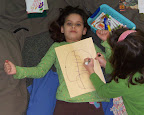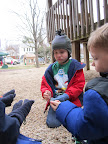When understanding science concepts becomes especially important
By Peggy Ashbrook
Posted on 2012-01-14
There is nothing like a family illness for making the point that it is important for the average person to have a basic understanding of science concepts. Several recent hospitalizations among family and friends have made me aware of how much there is for me to learn about medical science and engineering, even though I feel I have a good (but not advanced) understanding of physics, chemistry, biology and earth science, and some engineering. There are always choices for the patient and family to make, alternatives to weigh, and procedures to follow for better health. Some of those require us to understand what the blood tests are measuring, how blood pressure affects the body, which Continuous Positive Airway Pressure breathing mask to choose, and how medications work.
 Like imaginative play about Space, children enjoy pretending to be medical personnel, taking temperatures, looking at or drawing x-rays, and applying band-aides. This imaginative play supports childrens’ developing science understanding and an interest in learning more. Children’s play allows them to make beginning theories about how the world works. Undirected play also allows teachers to assess academic and social skills to see what we need to focus on in coming weeks.
Like imaginative play about Space, children enjoy pretending to be medical personnel, taking temperatures, looking at or drawing x-rays, and applying band-aides. This imaginative play supports childrens’ developing science understanding and an interest in learning more. Children’s play allows them to make beginning theories about how the world works. Undirected play also allows teachers to assess academic and social skills to see what we need to focus on in coming weeks.
After observing the children’s undirected play I ask myself, What materials can I add to the room to spur the students to extend their play using practices which will support their later learning in science and engineering? What group discussions will support students in the science and engineering practices of asking questions and defining problems, developing and using models, planning and carrying out investigations, analyzing and interpreting data, using mathematics and computational thinking, constructing explanations and designing solutions, engaging in argument from evidence, and obtaining, evaluating, and communicating information in unstructured and structured activities? What structured activities will focus on the concepts they appear to be exploring? And, how will all of this fit into the standards and curriculum of my program?
One example is the frequent math play I see the three and four-year-olds doing with manipulatives and their snack items. They are trying out, on their own, the concepts they’ve been working on with teachers and through their observations of the world. For the math-exploring young five, I might introduce the idea of using a Venn Diagram when grouping, by offering two hoops to define the groups. For the snack-sorter who is demonstrating a strong interest in one-to-one correspondence, I might ask “How are these objects the same and how are they different?” and “How many do you have all together?”

Another example of how science concepts can be explored during undirected play is learning about the friction (or lack of) between winter mittens and the playground sliding pole as compared to the friction between bare hands and the metal of the pole. When a child went down too fast for his comfort, I was able to have him compare a bare hand to a mitten-covered hand on the pole—a short experience and discussion about the nature of materials.
These small moments are positive steps towards building scientific literacy.
Peggy
Disclaimer: The views expressed in this blog post are those of the author(s) and do not necessarily reflect the official position of the National Science Teaching Association (NSTA).

